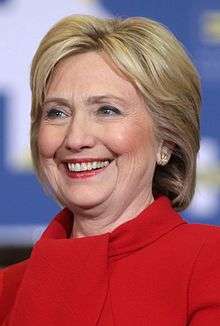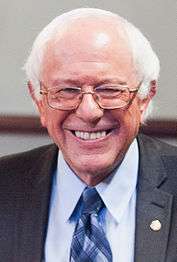Massachusetts Democratic primary, 2016
| | |||||||||||||||||||||||||
| |||||||||||||||||||||||||
| |||||||||||||||||||||||||
|
| |||||||||||||||||||||||||
| Election results by county.
Hillary Clinton
Bernie Sanders | |||||||||||||||||||||||||
The 2016 Massachusetts Democratic primary took place on March 1 in the U.S. state of Massachusetts as one of the Democratic Party's primaries ahead of the 2016 presidential election.
On the same day, dubbed "Super Tuesday," Democratic primaries were held in ten other states plus American Samoa, while the Republican Party held primaries in eleven states including their own Massachusetts primary.
Opinion polling
| Poll source | Date | 1st | 2nd | 3rd | Other |
|---|---|---|---|---|---|
| Primary results | March 1, 2016 | Hillary Clinton 49.7% |
Bernie Sanders 48.3% |
Others / Uncommitted 2.0% | |
| SurveyMonkey[1]
Margin of error: ± ?
|
February 22–29, 2016 | Hillary Clinton 48% |
Bernie Sanders 46% |
Others / Undecided 6% | |
| Emerson College[2]
Margin of error: ± 3.7%
|
February 26–28, 2016 | Hillary Clinton 54% |
Bernie Sanders 43% |
Others / Undecided 3% | |
| Suffolk University[3]
Margin of error: ± 4.4%
|
February 25–27, 2016 | Hillary Clinton 50% |
Bernie Sanders 42% |
Others / Undecided 8% | |
| WBZ-UMass Amherst[4]
Margin of error: ± 6.5%
|
February 19–25, 2016 | Hillary Clinton 47% |
Bernie Sanders 44% |
Others / Undecided 9% | |
| WBUR[5]
Margin of error: ± 4.9%
|
February 21–23, 2016 | Hillary Clinton 49% |
Bernie Sanders 44% |
Others / Undecided 7% | |
| Emerson College[6]
Margin of error: ± 4.75%
|
February 19–21, 2016 | Hillary Clinton 46% |
Bernie Sanders 46% |
Undecided 5% | |
| Public Policy Polling[7]
Margin of error: ± 4.2
|
February 14–16, 2016 | Bernie Sanders 49% |
Hillary Clinton 42% |
Undecided 9% | |
| Emerson College
Margin of error: ± 6.0%
|
October 16–18, 2015 | Hillary Clinton 59% |
Bernie Sanders 25% |
Jim Webb 5% |
Martin O'Malley 3%, Lincoln Chafee 3%, Other 2%, Undecided 3% |
| Emerson College[8]
Margin of error: ± ?
|
March 14–19, 2015 | Hillary Clinton 43% |
Elizabeth Warren 16% |
Joe Biden 10% |
Bernie Sanders 6%, Martin O'Malley 2%, Other/Undecided 24% |
| Gravis Marketing
Margin of error: ± 4%
|
January 19–21, 2015 | Hillary Clinton 46% |
Elizabeth Warren 22% |
Undecided 32% | |
| Suffolk University
Margin of error: ± 4.9%
|
August 21–24, 2014 | Hillary Clinton 55% |
Elizabeth Warren 17.25% |
Joe Biden 7.75% |
Andrew Cuomo 4.75%, Martin O'Malley 1.5%, Undecided 12.25%, Refused 1.25%, Other 0.25% |
| Public Policy Polling
Margin of error: ± 3.8%
|
May 1–2, 2013 | Hillary Clinton 55% |
Joe Biden 17% |
Andrew Cuomo 4% |
Deval Patrick 4%, Elizabeth Warren 4%, Martin O'Malley 1%, Kirsten Gillibrand 0%, Brian Schweitzer 0%, Mark Warner 0%, Someone else/Not sure 14% |
Results
Primary date: March 1, 2016
National delegates: 91
| Candidate | Popular vote[9] | Estimated delegates[10] | |||
|---|---|---|---|---|---|
| Count | Percentage | Pledged | Unpledged | Total | |
| Hillary Clinton | 606,822 | 49.73% | 46 | 21 | 67 |
| Bernie Sanders | 589,803 | 48.33% | 45 | 1 | 46 |
| Martin O'Malley (withdrawn) | 4,783 | 0.39% | 0 | 0 | 0 |
| Rocky De La Fuente | 1,545 | 0.13% | 0 | 0 | 0 |
| No Preference | 8,090 | 0.66% | – | 2 | 2 |
| All Others | 4,927 | 0.40% | 0 | 0 | 0 |
| Blank votes | 4,326 | 0.35% | – | – | – |
| Total | 1,220,296 | 100% | 91 | 24 | 115 |
Results By County
| County [11] | Clinton | Votes | Sanders | Votes |
|---|---|---|---|---|
| Barnstable | 48.7% | 21,889 | 50.0% | 22,456 |
| Berkshire | 47.6% | 12,916 | 51.0% | 13,851 |
| Bristol | 48.7% | 37,187 | 48.2% | 36,797 |
| Dukes | 44.8% | 2,312 | 54.4% | 3,804 |
| Essex | 48.7% | 65,679 | 49.3% | 66,797 |
| Franklin | 29.0% | 5,485 | 70.2% | 13,286 |
| Hampden | 50.3% | 31,766 | 47.0% | 29,699 |
| Hampshire | 40.4% | 14,309 | 57.6% | 24,638 |
| Middlesex | 51.5% | 170,096 | 46.9% | 154,785 |
| Nantucket | 47.5% | 979 | 51.5% | 1,060 |
| Norfolk | 52.7% | 72,105 | 45.2% | 61,835 |
| Plymouth | 48.3% | 39,165 | 49.6% | 40,219 |
| Suffolk | 56.6% | 79,314 | 41.5% | 58,134 |
| Worcester | 44.8% | 53,610 | 53.2% | 63,745 |
| Total | 49.7% | 606,822 | 48.3% | 589,803 |
Analysis
Clinton ran a close race against Bernie Sanders, much closer than her 15-point-win in the state eight years earlier against Barack Obama, but ultimately she came out victorious in the Bay State. She lost the Caucasian vote (85% of the electorate in Massachusetts) narrowly, 50-49, to Bernie Sanders, according to exit polls. She also lost the male vote 58-41. However, she won the non-white vote 59-41, and the votes of women 57-42 (including both married women 59-40, and unmarried women 53-46), which likely put her over the top statewide.
Sanders won among voters who had only a high school diploma or less, while Clinton won more highly-educated voters, including postgraduates, who made up a larger proportion of the Massachusetts electorate. And while Sanders won 54-46 among voters under the age of 45, Clinton won 54-45 with those over 45 years of age, including a resounding 59-39 victory among senior citizens. And while Sanders won 55-45 among voters who make less than $100k per year, Clinton won with more affluent voters.
In terms of political party affiliation, Clinton won Democrats (65% of the electorate) 60-40, but lost Independents to Sanders 66-33.[12]
While Sanders carried a majority of counties statewide, Clinton swept most of the major urban areas and cities, as well as the affluent suburbs. She won Boston by a large margin and also emerged victorious in other urban and more conservative towns such as Springfield and Worcester.[13]
The Clinton win in Massachusetts came as a major blow to the Sanders campaign on Super Tuesday, as he had wanted to win a blue, largely white and liberal state like Massachusetts resoundingly in order to stay competitive after disappointing losses across the Southeast.
Following the primary, Elizabeth Warren, the state's senior US senator, was widely criticized by Sanders supporters online for her refusal to endorse him prior to the primary. Supporters of Bernie Sanders have argued that an endorsement from Warren, whose political positions were similar to that of Sanders's, and who was a frequent critic of Hillary Clinton in the past, could have handed Massachusetts to him.[14] Warren though, had made it clear prior to the primary that she would not endorse either candidate until the end of the primary season, in which she eventually endorsed Clinton. Supporters of Clinton argued that the online attacks against Warren from Sanders supporters reinforced the controversial Bernie Bro image.
References
- ↑ "Trump's Lead Looks Steady in Run-Up to Super Tuesday". Retrieved 2016-03-01.
- ↑ "EMERSON POLL: CRUZ CLINGS TO NARROW LEAD IN TEXAS; TRUMP ROMPS IN BAY STATE, CLINTON PULLS AWAY FROM SANDERS" (PDF).
- ↑ "FINAL FEBRUARY MASS. DEM LIKELY VOTERS GeoCode" (PDF).
- ↑ "UMass Amherst/WBZ Poll of MA Likely Primary Voters" (PDF).
- ↑ "WBUR Poll: In Mass., Clinton Edges Sanders, While Trump Leads Big".
- ↑ "EMERSON POLL: IN MASSACHUSETTS CLINTON, SANDERS IN A DEAD HEAT; TRUMP TROUNCES ALL GOP RIVALS" (PDF).
- ↑ "March 2016 Democratic Primary Polls" (PDF).
- ↑ "Wix PDF" (PDF). media.wix.com. Retrieved 2015-07-09.
- ↑ "2016 President Democratic Primary". Retrieved 15 March 2016.
- ↑ The Green Papers
- ↑ http://electionstats.state.ma.us/elections/view/36510/
- ↑ "2016 Election Center". CNN. Retrieved 2016-09-25.
- ↑ "How did Hillary Clinton win Massachusetts Super Tuesday primary? Urban vote in Springfield, Boston made the difference". Retrieved 2016-09-25.
- ↑ http://reverbpress.com/politics/elizabeth-warren-attacked-bernie-primary-loss/


